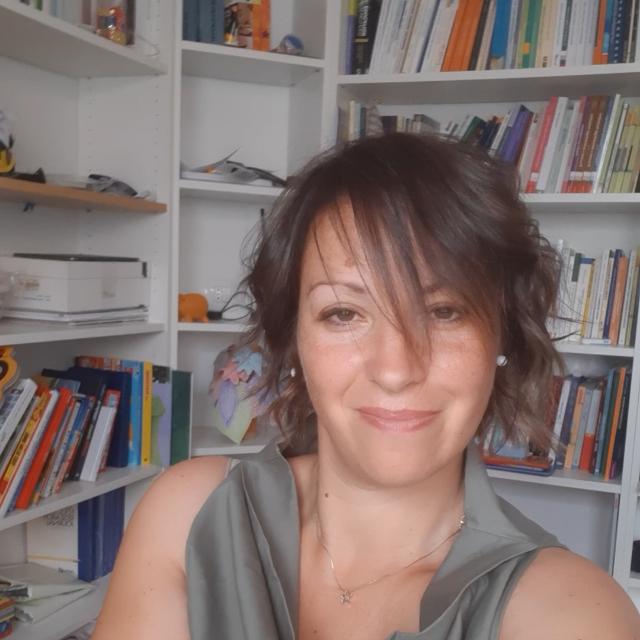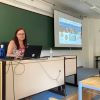Studying at the University of Verona
Here you can find information on the organisational aspects of the Programme, lecture timetables, learning activities and useful contact details for your time at the University, from enrolment to graduation.
Academic calendar
The academic calendar shows the deadlines and scheduled events that are relevant to students, teaching and technical-administrative staff of the University. Public holidays and University closures are also indicated. The academic year normally begins on 1 October each year and ends on 30 September of the following year.
Course calendar
The Academic Calendar sets out the degree programme lecture and exam timetables, as well as the relevant university closure dates..
| Period | From | To |
|---|---|---|
| Sem. 1A | Sep 25, 2023 | Nov 4, 2023 |
| Sem. 1B | Nov 13, 2023 | Dec 22, 2023 |
| Sem. 2A | Feb 19, 2024 | Mar 29, 2024 |
| Sem. 2B | Apr 9, 2024 | May 31, 2024 |
| Session | From | To |
|---|---|---|
| Sessione d'esame invernale | Jan 8, 2024 | Feb 17, 2024 |
| Sessione d'esame estiva | Jun 3, 2024 | Jul 27, 2024 |
| Sessione d'esame autunnale | Aug 26, 2024 | Sep 21, 2024 |
| Session | From | To |
|---|---|---|
| Sessione estiva | Jul 8, 2024 | Jul 13, 2024 |
| Sessione autunnale | Nov 4, 2024 | Nov 9, 2024 |
| Period | From | To |
|---|---|---|
| Festa di Ognissanti | Nov 1, 2023 | Nov 1, 2023 |
| Festa dell'Immacolata | Dec 8, 2023 | Dec 8, 2023 |
| Vacanze di Natale | Dec 23, 2023 | Jan 6, 2024 |
| Vacanze di Pasqua | Mar 30, 2024 | Apr 1, 2024 |
| Festa della Liberazione | Apr 25, 2024 | Apr 25, 2024 |
| Festa del Lavoro | May 1, 2024 | May 1, 2024 |
| Festa del Patrono S. Zeno | May 21, 2024 | May 21, 2024 |
| Festa della Repubblica | Jun 2, 2024 | Jun 2, 2024 |
| Vacanze estive | Aug 12, 2024 | Aug 17, 2024 |
Exam calendar
Exam dates and rounds are managed by the relevant Humanistic Studies Teaching and Student Services Unit.
To view all the exam sessions available, please use the Exam dashboard on ESSE3.
If you forgot your login details or have problems logging in, please contact the relevant IT HelpDesk, or check the login details recovery web page.
Should you have any doubts or questions, please check the Enrollment FAQs
Academic staff
 riccardo.bertolazzi@univr.it
riccardo.bertolazzi@univr.it
 erika.branchini@univr.it; erika.branchini@gmail.com
erika.branchini@univr.it; erika.branchini@gmail.com
 giacomo.mormino@univr.it
giacomo.mormino@univr.it
 alessandra.pantano@univr.it
alessandra.pantano@univr.it
 stefania.pontrandolfo@univr.it
stefania.pontrandolfo@univr.it
Study Plan
The Study Plan includes all modules, teaching and learning activities that each student will need to undertake during their time at the University.
Please select your Study Plan based on your enrollment year.
2° Year It will be activated in the A.Y. 2024/2025
| Modules | Credits | TAF | SSD |
|---|
2 modules among the following| Modules | Credits | TAF | SSD |
|---|
2 modules among the following| Modules | Credits | TAF | SSD |
|---|
3 modules among the following3 modules among the following1 module among the followingLegend | Type of training activity (TTA)
TAF (Type of Educational Activity) All courses and activities are classified into different types of educational activities, indicated by a letter.
Italian philosophy (2023/2024)
Teaching code
4S011619
Credits
6
Language
Italian
Also offered in courses:
- Philosophy and sexual Difference of the course Master's degree in Philosophy
- Philosophy and sexual Difference - Esercitazione of the course Master's degree in Philosophy
- Philosophy and sexual Difference - Lezione of the course Master's degree in Philosophy
Scientific Disciplinary Sector (SSD)
M-FIL/06 - HISTORY OF PHILOSOPHY
Courses Single
Authorized
The teaching is organized as follows:
Lezione
Esercitazione
Prerequisites and basic notions
Fundamental notions of modern and contemporary philosophy acquired with the Bachelor's degree.
Program
Antonio Gramsci's "Philosophy of Praxis". The course intends to offer a reconstruction of the main theoretical cores of Antonio Gramsci's philosophy of practice with regard to its genesis and structure. PART I (LESSONS) a) in order to grasp the genesis of the philosophy of praxis, the process of re-elaboration of Marx's philosophy will be retraced through the distancing from the traditional conception of historical materialism and the criticisms of the approaches of Benedetto Croce and Giovanni Gentile. Gramsci's intellectual development will also be placed in the context of the great historical and political turning points of the first half of the twentieth century, in particular the Bolshevik Revolution, the foundation of the Italian Communist Party, the rise of fascism and the resistance against its affirmation. b): the clarification of the theoretical structure of the philosophy of practice will be accompanied by the elucidation of the main notions focused on in the Prison Notebooks and in the Letters from Prison: "hegemony", "civil society", "passive revolution", "historic block" , “common sense and common sense”, “subordination”, “democracy”. PART II (EXERCISES) Seminar discussions will be organized (see teaching methods) aimed at deepening the aforementioned notions through the reconstruction of textual references (not easy to identify in the laboratory of the Notebooks) and to follow their developments in the contemporary philosophical debate (Edwad W. Said , Dipesh Chakrabarty, Alain Badiou, Axel Honneth). It is a question of re-reading the maximum expression of Western theoretical Marxism, freeing it from later political appropriations and showing its heuristic and critical efficacy with respect to contemporary processes, as shown by the assimilation of that categorical apparatus in postcolonial studies, in Subaltern studies, in the reflection on democracy from below and in research on ideology.
Bibliography
Didactic methods
The course will be held in accordance with the University provisions on COVID-19. The course will be divided into two parts: 24 hours of lectures (=4 CFU) and 24 hours of exercises (=2 CFU). Only the frontal lessons will be recorded and made available online. In the first part of the course (a, b), the teacher will provide the historical, theoretical and historiographical coordinates relating to the chosen theme according to a traditional method of presentation, always open to discussion and the active participation of the students. In the second part of the course, the teaching method will be declined in a seminar sense with discussions initially guided by the teacher, reports by the students and/or group work. The ways of interaction and collaboration between the teacher and the students, but above all between the students themselves, will in any case be subject to experimentation and possible redefinition during the lessons, in the light of the number of attending students, their possible proposals and specific training needs. The active and effective contribution of the students will be a crucial factor in the co-construction of the common path. Non-attending students must contact the teacher to agree on alternative and substitute teaching/learning methods.
Learning assessment procedures
Oral exam for the first part of the course + exercises (or substitute activity) for the second part of the course. The oral exam will be the same for both attending and non-attending students, and will focus on: 1) the presentation and commentary of a text taken from the Letters from prison or from the prison notebooks, pertaining to the notions and themes taken into consideration in the lessons (a,b). The texts in question will be made available in an anthology published by the teacher on the moodle platform. 2) On a book chosen from among the following: Norberto Bobbio, Ideological profile of the twentieth century, Garzanti, Milan 1995; Michele Ciliberto, The notebook factory. Studies on Gramsci, Edizioni della Normale, Pisa 2020; Angelo d'Orsi, Gramsci. A new biography, Feltrinelli, Milan 2018; Marcello Mustè, Marxism and philosophy of praxis. From Labriola to Gramsci, Viella, Rome 2018. The exercises carried out in class will be sufficient to establish the corresponding grade for the attending students. The verification methods for non-attending students will be clarified with the teacher during the interview aimed at also agreeing on alternative and substitute teaching/learning methods.
Evaluation criteria
The evaluation criteria will be the following: 1) knowledge of the key concepts and understanding of the relative problems; 2) ability to present clearly; 3) ability to analyze texts using appropriate vocabulary; 4) autonomy of thought; 5) active participation and evidence of effective improvement (exercises).
Criteria for the composition of the final grade
The final grade will be expressed out of thirty and will be the result of the weighted average of the assessments obtained in the two parts of the course.
Exam language
Italiano/Italian. Studenti Erasmus incoming possono chiedere di sostenere l’esame in inglese o in tedesco. Erasmus incoming students can ask to do the exam in English or in German.
Type D and Type F activities
SOFT SKILLS
Find out more about the Soft Skills courses for Univr students provided by the University's Teaching and Learning Centre: https://talc.univr.it/it/competenze-trasversali
CONTAMINATION LAB
The Contamination Lab Verona (CLab Verona) is an experiential course with modules on innovation and enterprise culture that offers the opportunity to work in teams with students from all areas to solve challenges set by companies and organisations.
Upon completion of a CLab, students will be entitled to receive 6 CFU (D- or F-type credits).
Find out more: https://www.univr.it/clabverona
PLEASE NOTE: In order to be admitted to any teaching activities, including those of your choice, you must be enrolled in the academic year in which the activities in question are offered. Students who are about to graduate in the December and April sessions are therefore advised NOT to undertake extracurricular activities in the new academic year in which they are not enrolled, as these graduation sessions are valid for students enrolled in the previous academic year. Therefore, students who undertake an activity in an academic year in which they are not enrolled will not be granted CFU credits.
| years | Modules | TAF | Teacher |
|---|---|---|---|
| 1° 2° | Ciclo tematico di conferenze – sulla "leadership femminile": dati, riflessioni ed esperienze | D |
Paola Dal Toso
(Coordinator)
|
| 1° 2° | Ten years of dreams, lapsus, missed acts". Ten years anniversary of 'TIRESIA', Research Centre for Philosophy and Psychoanalysis | D |
Matteo Bonazzi
(Coordinator)
|
| 1° 2° | Invisible plots in contemporary reality | D |
Rosanna Cima
(Coordinator)
|
| 1° 2° | University and DSA - Methods and strategies for tackling study and university studies | D |
Gianluca Solla
(Coordinator)
|
| years | Modules | TAF | Teacher |
|---|---|---|---|
| 1° 2° | Cities and Freedom | D |
Giacomo Mormino
(Coordinator)
|
| 1° 2° | Ten years of dreams, lapsus, missed acts". Ten years anniversary of 'TIRESIA', Research Centre for Philosophy and Psychoanalysis | D |
Matteo Bonazzi
(Coordinator)
|
| 1° 2° | Education and affectivity - 200 years after Christian education by Antonio Rosmini | D |
Fernando Bellelli
(Coordinator)
|
| 1° 2° | Gnoseology and Metaphysics Workshop | D |
Davide Poggi
(Coordinator)
|
| 1° 2° | IV Reading seminar of classical texts | D |
Alessandro Stavru
(Coordinator)
|
| 1° 2° | IV Reading seminar of classical texts | D |
Alessandro Stavru
(Coordinator)
|
| 1° 2° | IV Reading seminar of classical texts | D |
Alessandro Stavru
(Coordinator)
|
| 1° 2° | Nietzsche, tragedy, the tragic | D |
Alessandro Stavru
(Coordinator)
|
| years | Modules | TAF | Teacher |
|---|---|---|---|
| 1° 2° | Cities and Freedom | D |
Giacomo Mormino
(Coordinator)
|
| 1° 2° | Legal clinics | D |
Alessia Maria Aurora Bevilacqua
(Coordinator)
|
| 1° 2° | Ten years of dreams, lapsus, missed acts". Ten years anniversary of 'TIRESIA', Research Centre for Philosophy and Psychoanalysis | D |
Matteo Bonazzi
(Coordinator)
|
| 1° 2° | Gnoseology and Metaphysics Workshop | D |
Davide Poggi
(Coordinator)
|
| 1° 2° | Tai-Ti aiuto io | D |
Alessandra Cordiano
(Coordinator)
|
| 1° 2° | Verso le elezioni europee 2024 | D |
Massimo Prearo
(Coordinator)
|
Career prospects
Module/Programme news
News for students
There you will find information, resources and services useful during your time at the University (Student’s exam record, your study plan on ESSE3, Distance Learning courses, university email account, office forms, administrative procedures, etc.). You can log into MyUnivr with your GIA login details: only in this way will you be able to receive notification of all the notices from your teachers and your secretariat via email and soon also via the Univr app.
Competenze linguistiche
I crediti formativi universitari relativi alle "Ulteriori competenze linguistiche" (B1 informatizzato se seconda lingua; livello B2 completo se stessa lingua della triennale) possono essere acquisiti in una delle due seguenti modalità:
- iscrizione da parte della/o studente presso il Centro Linguistico di Ateneo (CLA ➔ https://cla.univr.it/it/test-e-certificazioni) per il sostenimento e il superamento delle prove + iscrizione, sempre da parte della/o studente, in apposita lista per la registrazione crediti e registrazione CFU (senza presenza) da parte dell’Università.
Oppure
- equipollenza di certificazioni linguistiche esterne: riconoscimento equipollenza di certificazioni linguistiche esterne (➔ https://cla.univr.it/it/servizi/riconoscimento-delle-certificazioni-linguistiche-esterne).
Gestione carriere
Linguistic training CLA
Internships
Graduation
Documents
| Title | Info File |
|---|---|
|
|
pdf, it, 99 KB, 13/10/23 |
|
|
pdf, it, 101 KB, 10/04/24 |
List of theses and work experience proposals
| theses proposals | Research area |
|---|---|
| Linguaggio e mito in Tolkien | ENGLISH LITERATURE - Critical Theory & Poetics |
| Dialettica del negativo in Meister Eckhart | HISTORY OF PHILOSOPHY - MIDDLE AGES |
| La felicità nel Medioevo | HISTORY OF PHILOSOPHY - MIDDLE AGES |
| Le figure di Eva e Maria in Ildegarda di Bingen | HISTORY OF PHILOSOPHY - MIDDLE AGES |
| IA. Una critica fenomenologica al concetto di Intelligenza Artificiale | The Human Mind and Its Complexity: Cognitive science, psychology, linguistics, philosophy of mind - Philosophy of science, epistemology and logic |
Practical information for students
Documents
| Title | Info File |
|---|---|
|
|
pdf, it, 325 KB, 02/05/23 |
|
|
pdf, it, 212 KB, 02/05/23 |
|
|
pdf, it, 131 KB, 02/05/23 |

 +39 045 802 8459
+39 045 802 8459

























